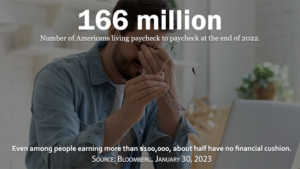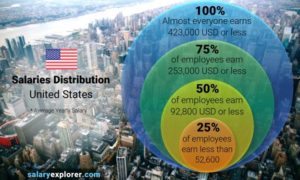
Marty Levine
February 8, 2023
There was a time when I didn’t think much about the importance of money and wealth. Growing up in a home with few luxuries, but without any question that there would be three meals for me to eat every day or any question of whereI would be sleeping each night, I did not have much to worry about. I knew my parents worked hard and were not extravagant spenders. They taught me what I know now is a sense of financial security that is not there for many people.
In eighth grade, I was part of a national study of educational outcomes (Project Talent). I remember being asked how much my peak earnings would be in the future.. My answer then was $8,000. That’s equivalent to about $80,000 today. That’s how little I thought about the meaning of wealth.
As I grew older, left my family home, married, and had children, money and wealth took on a very different meaning. Paying rent, buying food and clothes, and making a payment on the car I used every day to get to work were now my responsibility. Leaving home with only a few dollars in my bank account, a few shares of a small oil firm I had been gifted as a bar mitzvah present by my Texas uncle, and no family wealth to fall back on if needed, made balancing our checkbook an important activity, one filled with the tension of uncertainty that there was enough here to meet our growing needs.
Two working parents, a frugal lifestyle, and stable employment with slowly increasing salaries meant we never faced an imminent threat to our household. But I remember not infrequently being very frustrated, even depressed, by seeing that no matter how careful we were about how we spent our money and no matter how hard we were working we seemed to be treading financial water.
Decades later that feeling of insecurity remained, even though we were not really at risk. We had families to fall back on should we ever face a financial threat. And while they might not be extremely wealthy, they were secure enough to be that buffer.
And when I recognized this, I recognized how fortunate I and my family are.
In the last decade, after I stepped away from full-time employment, I have been very troubled that my country does not care about the millions who do not have that modest level of security and who are forced to live with a financial sword hanging over their heads.
Consider that a recent national survey reported as 2022 came to an end “sixty-four percent of U.S. consumers (166 million) were living paycheck to paycheck…up 3 percentage points from 61% the year prior, with the most growth seen in higher income brackets…the shares of middle-income consumers (those earning between $50,000 and $100,000 annually) and low-income consumers (those earning less than $50,000 annually)… sit at 66% and 78%, respectively…The data also finds that an increasing number of consumers earning more than $100,000 are living paycheck to paycheck with difficulty paying their monthly bills. In December 2022, 16% of these high-income paycheck-to-paycheck consumers struggled to pay their monthly bills, up from 11% in December 2021.”

These results are not surprising when the actual cost of living in modest circumstances is what it is. In my part of the world, Cook County Illinois, the Economic Policy Institute’s cost of living estimator finds that, to reach that level, it takes a bit more than $89,000 a year. In Dayton, Ohio where my wife was raised, a family of four needs more than $75,000 to live. In the Bronx, the part of New York City where I grew up, that number exceeds $115,000. With average salaries not exceeding $70,000 it is not hard to see why so many are struggling to go beyond a paycheck-to-paycheck basis.
Averages point us to the middle of the pack. And they leave unstated the recognition that while there will be many who fall above that line, there will also be many who fall below it. It is those millions of men women and children who find themselves in a nation that prides itself on having the world’s strongest economy, but they are food insecure (or hungry), housing insecure (or unhoused), and unable to get the medical care they need.

If I was worried at points in my life, I can only imagine the physical and emotional toll of facing those who this economy leaves behind.
As a nation, we have closed our hearts and our minds to the toll that this reality is taking.
Our social policies, the social safety net of programs we say will protect those at risk, are built on a skewed, deceitful perspective of reality. If the Economic Policy Institute PI estimates that a family of 4 would need almost $90,000 to afford a modest standard of living in Chicago, one that, I think, approximates my lifestyle of years ago, we have built our set of social programs using an artificially low “poverty level”, set presently at $30,000 for that family of 4, to determine who we are willing to assist. Even when we stretch eligibility to include those whose earnings are double that target, we are still falling below the needed level.
And working hard does not equate with financial security. The federal minimum wage is still set at $7.25 per hour, a level that is just a bit more than $15,000 annually. That means that a family of four with two parents working full time would just squeak over the Federal poverty line! Even the $15/hour target of many recent efforts to increase the minimum wage (about the average earning for the growing number of warehouse workers) still leaves many well below the real cost of living. And remember that for many (tipped workers, gig workers, etc.) those modest minimum wage guarantees do not exist.
Sitting underneath this statistical picture is another part of the reality that we, as a nation, refuse to reckon with. Present-day earnings and family wealth are often the end result of the bigotry and discrimination that have been part of our national story from the very beginning. For people of color, the playing field has never been level. My family had advantages denied to others solely on the basis of color.
Over the past several years we have seen the results of building a true safety net, one which provides more robust protections to all. The cash assistance that trickled out of the COVID-relief bills helped millions of our neighbors see their lives become more economically secure. The Affordable Care Act has made medical care affordable for millions. Governmental and philanthropic guaranteed income programs have been successfully piloted in hundreds of locations. In so many ways the results are clear. Ensuring better financial security makes life better and allows people to actually do more to improve their lives beyond the level of that support. But this has been a lesson we refuse to learn.
We continue to deny that we have an economy that, on its own (just trusting the silent hand of the marketplace) will not give economic security to us all. We refuse to recognize that individual effort, especially for those against whom the system has been rigged, will never be enough. We refuse to recognize that we have a collective responsibility to our neighbors and that this is a job that, as inefficient as it may be at times, the government can do best.
There are some instances when we are willing to stretch the helping hand of the government out and open our eyes. But too often they are more focused on the better off than they are on those who are most insecure. We have created a tax code that protects high earners and the wealthiest among us. In my state, Illinois, we have refused to change our constitution to allow our state income tax to be graduated so those who can pay at higher rates will do so.
And now in Ohio the Governor and the Republican-controlled state legislature are prepared to give one benefit to those earning up to 400% of the federal poverty guidelines. But that benefit is a guaranteed income program, or rent assistance, or Medicaid or enhanced nutrition aid. It is a school voucher program, a program that research has shown funnels funding to families who have never been in “failing” public schools. “In an analysis of one proposed bill, the nonpartisan Legislative Services Commission found that two-thirds of kids getting vouchers in Ohio’s expansion program have never been in public schools..”
And so, as I noted above, we allow successful safety net programs to fade away. T And as they do we ignore the real pain of economic insecurity. So it is not surprising that, according to a recently reported Gallop survey, that “most lower-income Americans, 61%, say their financial situation has deteriorated over the past year, while less than half that number, 26%, indicate it has improved. Middle- and upper-income Americans are also more likely to say they are worse off than better off, but by much narrower margins than seen among the lower-income group.”
Is this really the best we can do?
